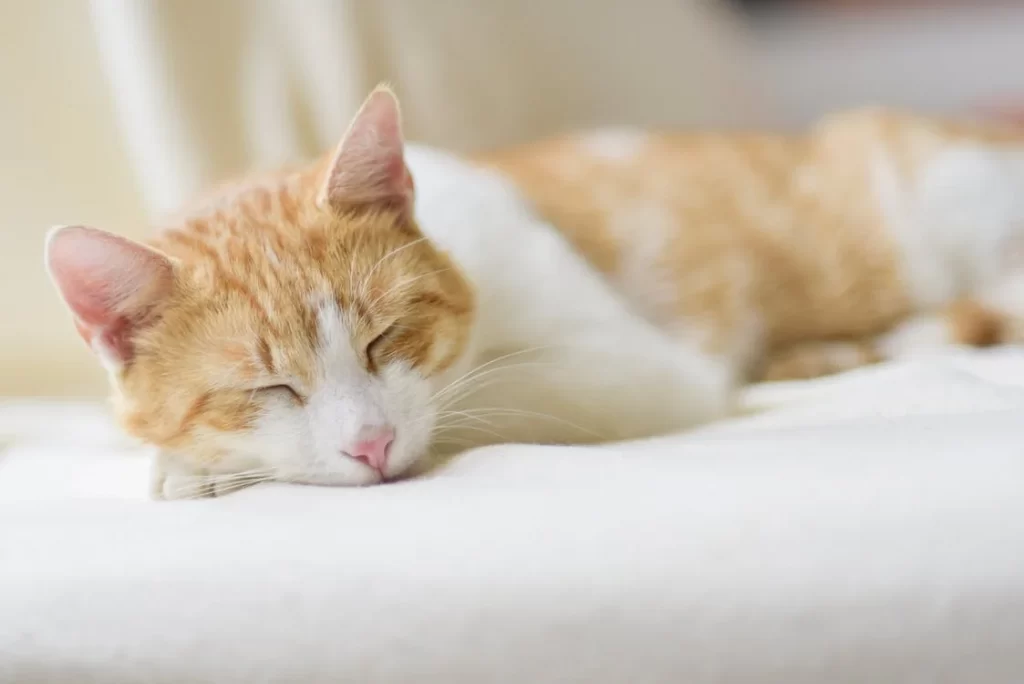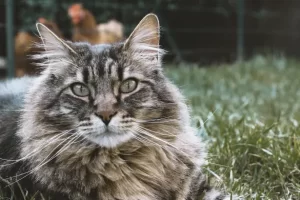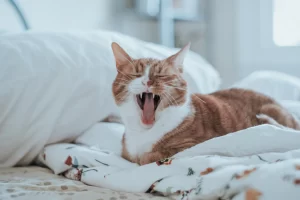Last updated on January 27th, 2023 at 04:20 am

What Is Cat Purring?
This is a continuous, low-pitched sound made by cats that are generally interpreted as a sign of happiness or relaxation. It’s usually heard when a cat is napping or being petted, and it’s been likened to a buzzing. It is thought that purring is an evolutionary adaptation for cats. Scientific studies have found other reasons for cats to purr when they sleep, including physiological benefits such as stress relief and pain reduction and psychological benefits such as comfort and communication.
Cats frequently engage in the human-like habit of purring. Humans are commonly drawn to this enigmatic and fascinating sound. These studies aim to understand better why cats purr and the consequences of this activity. It has been widely held that cats purr to show their satisfaction and safety in their sleeping quarters.
This article will explore the various theories as to why cats purr when they sleep at night and discuss the implications of this behavior: some of the theories put forward include:
1. The Comfort Theory (proposed by Karen McComb): Cats purr to comfort themselves and create a sense of security in unfamiliar or stressful environments.
2. The Attention Theory (proposed by Dr. Elizabeth von Muggenthaler): Cats purr to solicit attention from their owners.
3. The Bonding Theory (proposed by Dr. Sharon Crowell-Davis): Cats purr to strengthen their bond with their owners.
4. The Pain Relief Theory (proposed by Dr. Karen Overall): Cats purr to reduce their pain and discomfort.
5. The Rumbling Theory (proposed by Dr. John Bradshaw): Cats purr to communicate with other cats.
6. The Socialization Theory (proposed by Dr. Maud L. Backhurst): Cats purr to show their acceptance of other cats.
7. The Hunting Theory (proposed by Dr. Elizabeth von Muggenthaler): Cats purr to attract prey.
Physiological Benefits
- Pain reduction
The most widely accepted theory of why cats purr when they sleep at night is related to the physiological benefits of purring. According to a veterinarian, Dr. Karen Becker, “Cats purr vibrate at a frequency of 25-150 Hertz, which happens to be the same frequency at which muscles and bones best repair and heal themselves.” This suggests that cats purr to help speed up their healing process in the comfort of their own home after a long day of physical activity.
In addition, a study conducted by researchers at the University of California, Davis, found that cats purr at a frequency that has been shown to reduce pain and promote healing. This could explain why cats purr when they sleep at night, as the sound of the purr may help to reduce any pain and discomfort they may be feeling
- Stress relief
According to an article in Science Direct, “purring may be a form of self-soothing mechanism in cats and is often associated with positive emotions, such as contentment and relaxation.” This is supported by a study conducted by researcher Karen McComb, which found that cats purr when they are in a positive emotional state. The sound of the purr is believed to have a calming effect on cats, helping them to relax and reduce their stress levels. This could explain why cats purr when they sleep at night, as it may help them to de-stress and feel secure in their environment
- Temperature regulation
Cats may also purr when they sleep at night as a way to regulate their body temperature. According to animal behaviorist Dr. Roger Mugford
“The frequency and amplitude of purring vibrations can help regulate a cat’s body temperature, helping them stay cool in hot weather and warm in cold weather.” This suggests that cats may purr when they sleep at night to help regulate their body temperature and keep them comfortable.
Psychological Benefits
- Communications
Another possible explanation for why cats purr during the night is that it’s a way for them to communicate with one another. According to Dr. John Bradshaw, an animal behavior expert at the University of Bristol, “Purring is a kind of communication used by cats both with their humans and with other felines.” Purring is a typical form of communication among cats, and while it’s usually a pleasant message, it’s sometimes employed in a more confrontational situation. The sound of a purring cat can convey various emotions, from contentment and joy to fear and anxiety.
Additionally, a paper published in Animal Cognition suggests that cats purr to express their happiness and strengthen their relationships with one another. In a study by researchers at the University of California, Davis, scientists back this up by finding that cats are more likely to purr when they are physically close to one another. Some researchers believe cats purr at night as a kind of communication between themselves.
Another theory for why cats purr when they sleep at night is that they are trying to communicate with their owners. A study conducted by Dr. Karen L. Overall, a clinical animal behaviorist, and professor of psychiatry at the University of Pennsylvania, found that cats often purr when they want attention or food from their owners (Overall, 1997). This suggests that cats may be purring when they sleep at night to try and communicate their needs to their owners.
- Comfort
The act of purring has a secondary psychological effect: it offers cats a sense of warmth and security. “Purring is supposed to give the cat comfort and security,” writes the author of a paper that appeared in Animal Cognition. This is confirmed by the findings of a study that researcher Karen McComb carried out. The study discovered that cats purr when they are in a happy emotional state. It is possible that cats purr at night because they get a sense of comfort and security from the sound of their own purring, which would explain why cats purr when they are sleeping.
- Bonding
According to the findings of research carried out by Dr. Elizabeth von Muggenthaler, cats purr when they are in close proximity to other cats, such as when they are grooming one another or snuggling with one another (von Muggenthaler, 2018). This lends credence to the theory that purring is a nighttime behavior that cats engage in to strengthen their social bonds with other cats.
Conclusion
Cats purr when sleeping to express satisfaction and comfort. According to scientific studies, the frequency of purring contains healing vibrations that help cats heal and remain healthy. Additionally, cats purr to connect with their owners and with other cats. The sound of a cat purring may be soothing and comforting at night and is a wonderful reminder of the special link between cats and their owners. Cats purr during the night to communicate their pleasure and sense of safety in their habitat.
According to scientific studies, cats purr during sleep for various reasons, including physiological benefits such as stress alleviation and pain reduction and psychological ones such as comfort and communication. These advantages may explain why cats purr while sleeping, as the sound of the purr may help them relax and feel safe in their environment.


